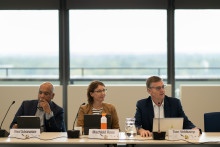'Not an optimistic financial picture', council member Emile Dopheide introduced the subject. The UT's long-term financial plan, the so-called Spring Memorandum, predicts that the UT will have to cut roughly 30 million euros per year in the coming years. This, combined with figures from the most recent management report – the UT is heading for a deficit of 14 million euros this year – worried the University Council.
However, it was not only a concern about the financial situation, it is mainly the approach to it, as the meeting showed. The Council doubts whether the chosen approach is sufficiently effective and expects the Executive Board to take a more active, leading role. Because, as Dopheide said: 'The Executive Board says that difficult choices have to be made, but it is not clear to us what these choices are.'
'Journey with hurdles'
President of the Executive Board Vinod Subramaniam responded by outlining the context. 'First of all, the political context; the outline agreement does not look optimistic, but we may still be able to influence choices. In addition, we are not the only university struggling with financial difficulties. And yes – we are facing a major financial challenge, but let's acknowledge that it is a small percentage of our total budget (which is between 450 and 500 million annually, ed.).'
Vice-president Machteld Roos picked up on this with a metaphor. 'It's a journey we make, sometimes one with many hurdles. Sometimes the path we take changes because of the changing context. We are in that process now. We need to accelerate that process, the entire community realizes that.'
Lots of questions
However, the University Council mainly had questions about the relationship between the Spring Memorandum and the previously presented 'building blocks'. Council member Pieter Boerman wondered what the motivations behind them are, how they are implemented and what they should yield financially. That relationship between those building blocks and the Spring Memorandum is unclear, according to Boerman.
His colleague Eline Marsman made this concern more concrete. 'There are statements in the Spring Memorandum about education; There must be a minimum intake per bachelor's and master's programme, and the student-staff ratio must be increased. If that has to change, it means either more students or fewer employees. What am I reading between the lines here? How should we interpret such rules of thumb? How are they achieved? I notice that I have a lot of questions.'
No insight into the costs of programmes
Rector Tom Veldkamp replied that it must first become clear how time and money is spent by the study programmes before decisions can be made. 'There are currently no such insights. While you do need them before you take action. Everyone is willing to help reduce costs. A top-down decision is not going to help us. We need to understand the costs and trust people to do the right things.' The rector expects to have these insights in September/October.
At the end of the day, the University Council said it would only agree to the financial plans under certain conditions. First, the measures such as a better student-staff ratio and more efficient education must be worked out better.
No decisions made
Moreover, the University Council will only approve the plans once the Executive Board formally announces an organisational change. As University Council President Herbert Wormeester explained: 'I already hear people in various departments say that such an organisational change is already taking place and that discussions are being held with people about the interpretation of their positions. If you haven't announced a formal organizational change, you are not allowed to have those conversations at all. You have to formalise it, to create structure and transparency.'
The Executive Board did not want to make that decision. 'It's too early for that, we need to investigate this carefully first’, said Roos. When asked to specify and quantify the financial effects of a number of measures, the Council was asked to have patience. The Executive Board will come back to this in two weeks' time.







